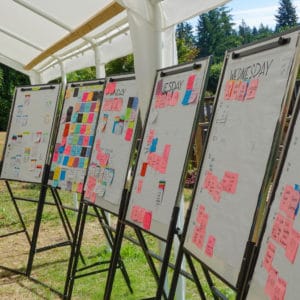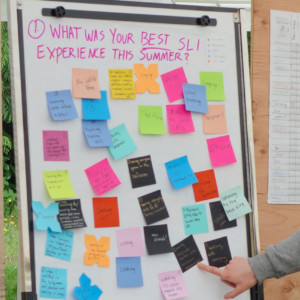
If you read many of the WAYK blog posts, you may notice that language learning is a dynamic process that includes dozens of learning techniques, process tools, and juggling short-term and long-term planning. A day in the life of a summer language intensive is packed with scheduling, language hunting, taking care of administrative tasks, cleaning the space, and participating in language learning lesson plans. Whether you are a new language learner or have been around the block a few times, the schedule of events can be very overwhelming. To manage our energy levels, WAYK uses a technique called “Full Check.”
Technique: Full Check is utilized to measure the full levels in the room. For those of you that do not know, Full is a term we use to describe how high people’s energy levels are in the room after participating in a “filling” activity. Being Full in the WAYK context is similar to being full after eating a large meal (think: Thanksgiving full). During dinner it is common to ask if everyone at the table wants seconds. If we are too full, we generally say so. “Full Check” is a technique we use to manage our energy levels. For example, after participating in three different lessons the instructor will announce “Full Check.” The facilitator is asking if the participants/learners are on language overload and if they should stop and take a break, or should they continue giving lessons. This helps individuals in the room self regulate their energy levels.
What happens however when a person or several people in the room cannot self-regulate their energy levels and “refill” after being Full? This is often the case for people who live with chronic pain or have a mental illness such anxiety, depression, bipolar disorder, etc. This can complicate how people participate in group activities during the day. This struggle is invisible because the symptoms themselves are invisible. This is why the use of “spoons” as a metaphor has exploded into popularity among people living with a mental illness or chronic pain.
For those of you that do not know, spoon theory tries to explain how pain, fatigue, and symptoms triggered by mental illness can affect the daily life of a person with a disability. Christine Miserandino, a woman with lupus, wrote an essay titled “The Spoon Theory,” about her experience of explaining to a friend what is like to do daily tasks and live with lupus. While they were sitting in a café together, Christine began grabbing spoons from all the tables. Spoons, in essence, represent energy levels. People with a disability start the day with a limited amount of spoons. Every activity, even sitting up and stepping out of bed costs a certain amount of spoons. Once they are out of spoons, they are out of spoons/energy, unless they borrow from another day. However, the next day will be very rocky.
What then does this mean for those of you that are interested in WAYK language learning techniques, including Technique: Full and Technique: Full Check? For starters it is helpful to remember that an energizer, will not necessarily “unfill” everyone in the room. I do not necessarily have all of the answers for strategies to support individuals that run out of “spoons/energy.” I do, however, hope to spark a conversation in the language learning community.
Post authored by Talia.




